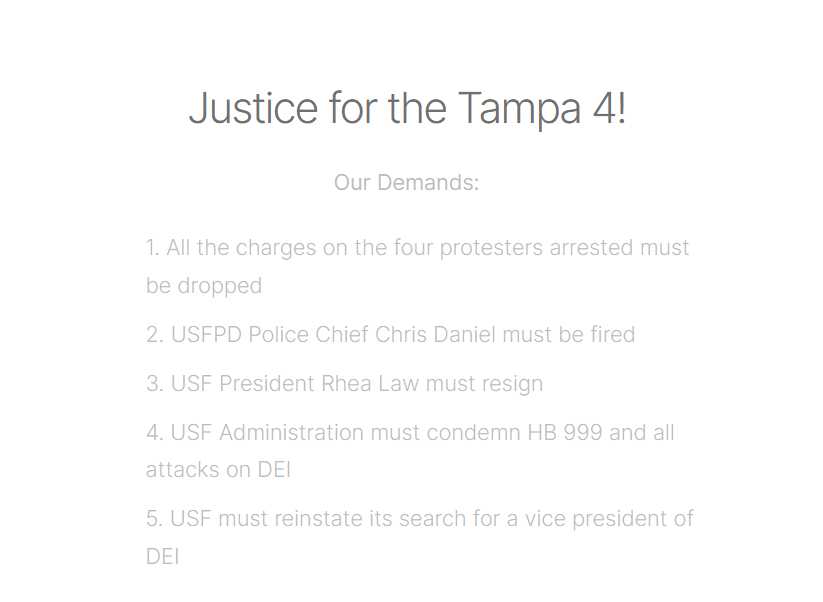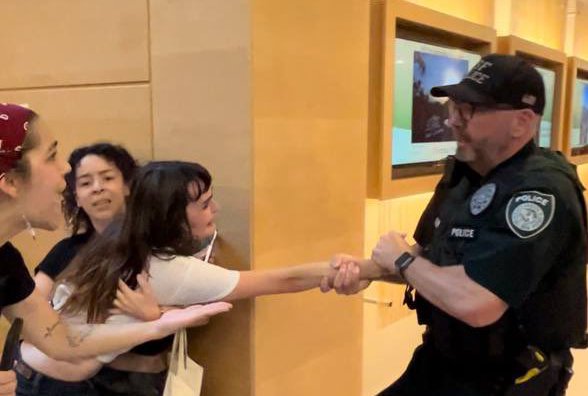Four people were arrested by the University of South Florida (USF) campus police on Mar. 6 while protesting in support of diversity, equity and inclusion (DEI). Designated as the “Tampa 4,” the arrested individuals included two USF students, a staff member and an alum of the university. The protest was organized by Tampa Bay Students for Democratic Society (SDS) and was a continuation of the organization’s campaign to increase enrollment of Black students at USF. The group of approximately 25 protesters marched from the Marshall Student Center to the Patel Center for Global Solution demanding to meet with USF President Rhea Law to ask what she is doing to protect marginalized students.
Per their website, “Tampa Bay SDS is a chapter of a nationwide student-led, multi-issue, action-oriented organization called Students for a Democratic Society(SDS).” SDS is a progressive organization looking to lead change on university campuses through active campaigns. The organization was re-founded in 2006 in protest against the U.S. invasions of Iraq and Afghanistan, inspired by the anti-war movement built by the original SDS in the 1960s and 70s.
“We initially had that protest to save diversity at our school, because we’ve been under recent attacks from the Florida Gov. Ron DeSantis that have threatened to cut diversity programs,” Victoria Hinckley said, an organizer and USF student with Tampa SDS who was at the protest the day of the arrest.
“Our college has not done much despite those attacks,” Hinckley criticized. “They haven’t come out in support of DEI. They haven’t released any statements specifically denouncing these attacks. They haven’t done any work to increase diversity measures in response to those attacks.”
”Without having a diversity program at our school, increasing Black enrollment is nearly impossible,” she continued.
Hinckley explained that the specific demands for the protest were for the college to continue its search for a Vice President of DEI, for USF’s College of Arts and Science to get a new DEI committee after the old one resigned and for the school to release a public statement in support of DEI and diversity measures.
“I think it’s important to have a diverse campus,” Hinckley said. “So that, you know, all students are welcome, and all students are supported by the university that they go to and there shouldn’t be any place for exclusion or discrimination on our campus.”
Hinckley explained that at the protest itself, there should have been no issue for the group.
“It’s a university building,” she elaborated. “It’s not a private building. There was no issue of protest. We went in there, we wanted to meet with our university president and that’s basically it. The police just escalated the situation entirely. There were no de-escalation measures. They started being outwardly violent towards students and protesters. And it was just a scary experience.”
According to the Tampa Bay Times, USF police spokesperson Michael Lavalle said that the protesters were “causing a loud disturbance.”
“Despite the attempts of officers to peacefully deescalate the situation and escort the protesters out of the building, several of the individuals then became aggressive and initiated physical altercations with police,” Lavalle said.
“I can quite confidently say that the police have been telling an untrue version of the story,” Hinckley asserted.
In a video posted by the Tampa Bay Times, students are shown chanting in the building before suddenly one person is grabbed and pulled by police officers.
“They were grabbing people that weren’t being violent,” Hinckley said. “They were throwing them around. They were hitting people. They were slapping people. They were groping people. Not only is that traumatic, it left us with physical reminders of the event.”
Hinckley also expressed that there was no announcement of the arrest, communication or reading of rights.
The “Tampa 4” include: Gia Davila, a 21-year-old USF student; Laura Rodriguez, a 23-year-old USF alumna; Jeanie Kida, a 26-year-old USF student; and Chrisley Carpio, a 31-year-old USF employee.
Since the initial arrest, the “Tampa 4” have been released after being held in the county jail for “over eight hours” according to Tampa Bay SDS. The four have allegedly been left with charges after the arrest, although it is unclear what these charges may be. After the release, Tampa Bay SDS updated their demands for USF: that “all the charges on the four protesters arrested must be dropped,” that “USFPD Police Chief Chris Daniel must be fired” and “USF President Rhea Law must resign.”

Additionally, Tampa Bay SDS has started a GoFundMe campaign to help the “Tampa 4” with legal fees.
When asked about the likelihood of police intervention in protests happening at New College, Campus Police Department (CPD) Chief Jennifer Coley stated over email that “campus police may get involved if criminal activity or policy violation occurs during a protest, but not for merely protesting.
“If protestors block the flow of traffic, prevent entry into or exit from buildings or facilities, or are so noisy that they are disrupting classes or administration functions, those activities (not the protest itself) must stop,” Coley continued. “However, if protestors call for imminent violent or criminal activity, engage in actual violence or threats of violence, vandalism, or destruction of property, appropriate safety and security measures will be taken.”
Hinckley explained that what happened at USF could happen anywhere, and that the arrests and brutality are not surprising.
For Hinckley, after the traumatic events, it’s about taking it “day-by-day.”
“I found that being with my fellow organizers and my fellow SDSers is the best way to go about it,” Hinckley said, maintaining her positive outlook. “And, after this event we have the upper hand. USFPD was in the wrong. Administration was in the wrong.”

